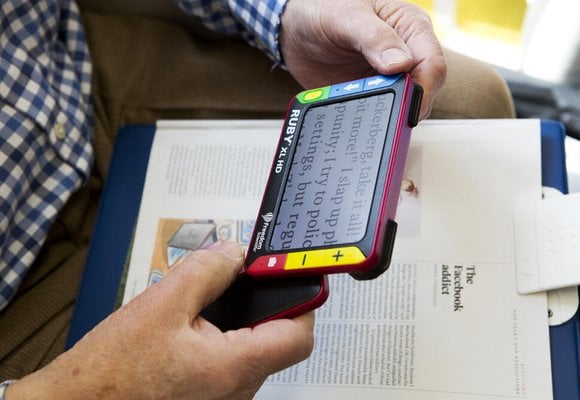2021 review: How accessible was our TV?
This review reflects viewer complaints received by the media and culture team at RNIB.
Text on screen (subtitles and graphics)
Where: News bulletins, programmes and documentaries
It was the issue of text on screen, without a voiceover, that generated most complaints from blind and partially sighted viewers this year. The lack of English dubbing on foreign language soundbites in news bulletins, programmes and documentaries, frustrated that audience the most. Although complaints panned most TV news broadcasters, BBC’s news and current affairs show, Newsnight, became the most complained about programme in this context.
One of the reasons news content is exempt from mandatory targets for audio description is that as it is audio led, it is inherently accessible for viewers with sight loss and most broadcasters already have editorial guidance already in place to address this issue. It is only a matter of reminding the programme producers of its existence.
Compared with previous years, fewer complaints were logged about foreign language dramas not supporting audio subtitles or audio description in English on UK television. With services like Netflix, Prime and others offering massive libraries of foreign language dramas with dubbing and audio description in English, this doesn’t come as a complete surprise.
The (unreliable) video on demand service (VoD)
In 2021, the UK’s Communications regulator, Ofcom, submitted its second set of recommendations to the Government on making the accessibility of VoD services a legal requirement. However, the government has so far failed to act on these and, as a result, VoD services have continued to remain patchy and unreliable for blind and partially sighted viewers.
Complaints reported issues including:
- audio description being available only on a few platforms for most services
- audio description missing from content premiered online
- lack of audio description on boxsets
- content previously broadcast with audio description lacks audio description when made available on another platform.
These issues affected most popular VoD services.
We understand the industry is still working through issues relating to licenses, formats and resources, among many others, to resolve these. But given that over ten years have passed since audio description was first broadcast on an VoD service, maybe what’s needed is legislation for them to agree on viable solutions.
Viewer experience: Platforms and apps launched without consideration of accessibility
Even if all the content issues outlined in the point above were resolved, viewers with vision impairments would have still struggled to find the content that they wanted to watch because of the way apps were designed. That’s especially true for the bigger screens such as Connected TVs. Whilst we can now expect to see most VoD apps for smaller devices such as phones and tablets to work with screen readers, that’s still not the case with other platforms, which ultimately means people with vision impairments being forced towards the smallest screens and cut out of the shared viewing experience.
On a more positive note:
Year of sport: Olympics & Paralympics, Disability Cup
In July, BT Sports broadcasting audio description and sign language on the live telecast of the 2021 Disability Cup was a big moment for football fans who rely on audio description to watch TV. Hopefully this won’t be the last.
Two months on, in September, Channel 4 broadcast the live opening and closing ceremonies of the 2020 Tokyo Paralympic Games with audio description. These were later made available on All4 for those who had missed the live broadcast along with the day’s highs and lows in the games highlights every day. The broadcaster also ran a campaign with RNIB to encourage advertisers to make their TV and other video ads accessible for blind and partially sighted viewers.
Strictly Come Dancing
The other big moment was unveiled on BBC. For the first time ever, all episodes of Strictly were audio described. It would have been a golden moment if the audio description was delivered with the first telecast of each episode but, as it was the first time ever that any episode other than the Christmas special was described, it still makes the list.
Audio description was added to the rerun of each episode on linear TV and made available on the iPlayer later.
With Strictly topping the list of programmes that blind and partially sighted viewers want to watch with audio description for more years than we can remember, this was certainly a moment to celebrate. Big thanks to BBC and Red Bee for making this happen.
Boxsets
Whilst Prime Video, Netflix, Apple TV+ and Disney+ are likely the destinations for viewers who use audio description and looking for a boxset to binge, one UK broadcaster has been steadily building up a library of their own. Boxsets of Inspector Morse, British detective drama television series based on a series of novels by Colin Dexter, and many others are now live with audio description on the ITV Hub. Well done ITV for taking the lead.
Viewers can use the Android or the iOS app to watch programmes with audio description on the ITV Hub.
In general, we noticed a growing consideration for audio description and accessible media.
We watched more ads being released that were accessible for viewers with vision impairments. And we received even more queries from the industry on how to make TV ads and other short form assets accessible for viewers with vision impairments than ever before! Whether it’s by adding audio description or integrating accessibility at the creative stage, the future looks promising.
That’s a wrap for 2021 and thank you to all those who have worked hard to make their media and culture services accessible for people with vision impairments. We will see you in 2022.
Please email [email protected] should you wish to discuss access to media and culture services.







